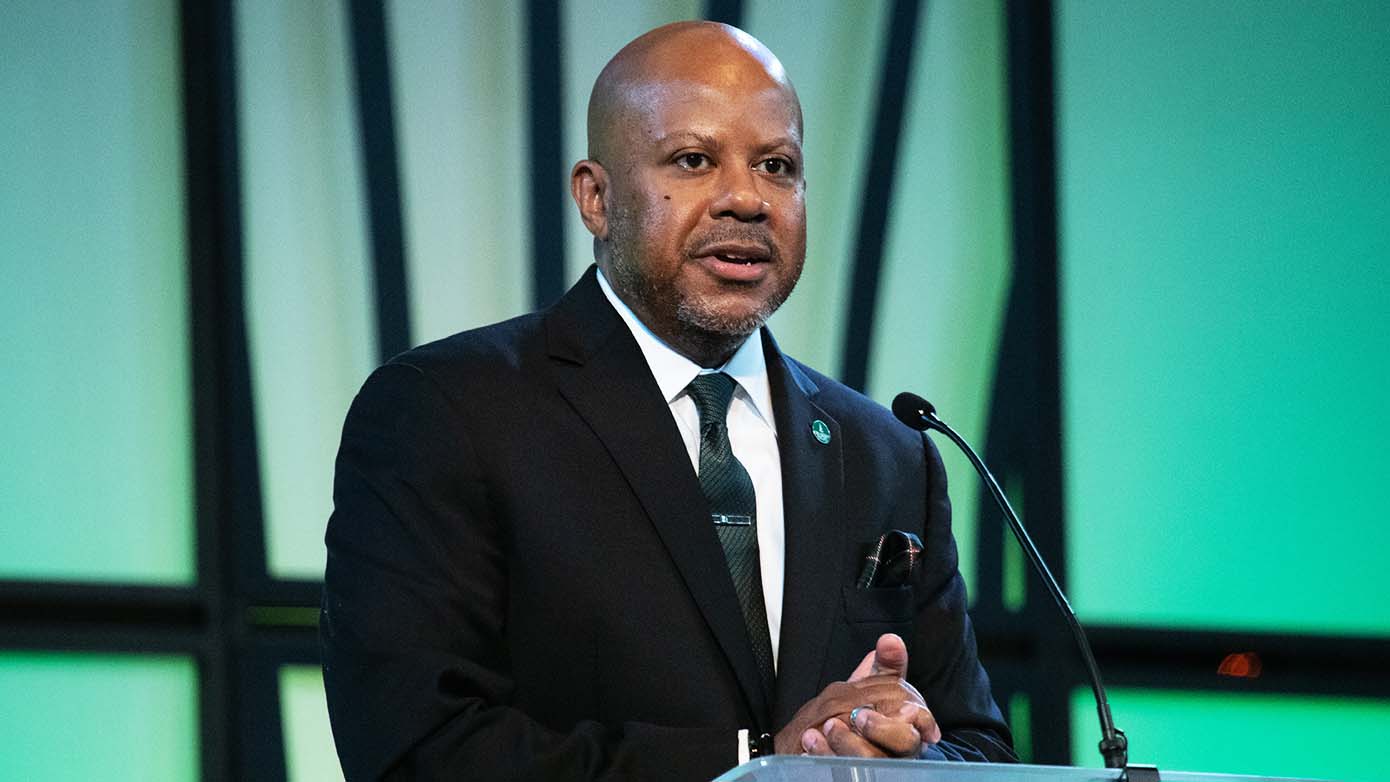Scott Discusses Church Response to Tulsa Race Massacre During Gaskin Lecture Sept. 27
September 27, 2021
Reverend Anthony L. Scott, pastor of First Baptist Church North Tulsa, delivered OBU’s Gaskin Lecture Sept. 27 in Raley Chapel’s Potter Auditorium. Scott lectured on “The Church’s Response to the Tulsa Race Massacre,” reflecting back upon the event 100 years later.
The J.M. Gaskin Lectureship is named in honor of Dr. J.M. Gaskin, the first historical director for the Baptist General Convention of Oklahoma. He and his 15 books about Oklahoma Baptists provided the major drive for Oklahoma Baptist research and publication over the last four decades. The intended purpose of the lectureship is to provide and sustain a series of lectures that will preserve and promote the study of Oklahoma Baptist history and heritage.
For this Gaskin Lecture, Scott focused on the church’s response to the Tulsa Race Massacre of May 31 and June 1, 1921. As the pastor of First Baptist Church North Tulsa, he and his congregation are close to the historical tragedy and own many firsthand accounts of the event from former congregation members.
According to the Tulsa Historical Society and Museum on their website Tulsahistory.org, the Tulsa Race Massacre, also known as the Attack on Greenwood was, “one of the most significant events in Tulsa’s history.” At the time,Tulsa’s Greenwood District was recognized nationwide for its successful and affluent African American community, leading to it be referred to as “Black Wall Street.”
Following accusations made against a young Black man named Dick Rowland, Greenwood was looted and burned by white rioters beginning in the early morning hours of June 1, 1921. When the violence ended, “35 city blocks lay in charred ruins, more than 800 people were treated for injuries and contemporary reports of deaths began at 36,” according to the Tulsa Historical Society. Many historians now estimate the death toll be have been as many as 300 people.
Scott drew a connection between the perspective shared in Lamentations 3:19-24 and the perspective of those who lived through the Attack on Greenwood. In the lament, Jeremiah is crying out to God in light of the destruction of the temple in Jerusalem, but halfway through the passage there is a pivot from his mourning, to hope and trust in the Lord.
“The voice of the church, when it comes to evil and suffering and tragedy, must grapple with three questions,” Scott said. “Where is God in all of this? What does this say about God? Where is the hope in all of this?”
According to Scott, God wants us to reflect on events such as these because he wants us to have great prospects for the future, moving us from a tragic occurrence to a more positive and brighter future.
“The voice of the church has to make ... a nation wrestle with its past,” Scott said, “that we might provide an entrance to the gospel message that helps us deal with our past.”
Scott noted that wherever there is total destruction, there can be total regeneration because through God, “even in the chaos of devastation and tragedy, there is still a sense of order in the world.”
Therefore, the church must let the world know that we serve a God that can bring order out of any chaotic and tragic situation. Yet, according to Scott, the church that witnessed the Attack on Greenwood failed to do this.
“The church and the body of Christ missed a golden and grand opportunity to let the world know how the gospel of Jesus Christ can take an unedited tragedy and restore it for his good,” Scott said.
According to Scott, we can’t simply reflect on the tragic events of 1921 without utilizing the glory of the gospel to pivot from despair to hope.
“It all pivots on the steadfast love of God,” Scott said in light of Jeremiah’s lament and reviewing the events of the Tulsa Race Massacre.
Scott has served in pastoral ministry for 28 years, the last 13 of those years in his current position as the lead pastor of FBC North Tulsa. He has previously spoken on the OBU campus, including during the 2019 OBU Pastors School as well as during chapel service in 2018. He graduated from Thomas A. Edison High School in Tulsa, before earning a Bachelor of Business Administration from Langston University. He then earned both a Master of Theology and a Master of Ministry from Andersonville Theological Seminary.
He is the vice president of the western region of the National Baptist Convention, USA, Inc., and the president of the Oklahoma Baptist State Convention. He served briefly as an adjunct professor at Bacone College and has served as a guest lecturer at OBU, Tulsa Community College and other academic institutions. Fulfilling his passion to write, he contributes regularly to the Oklahoma Eagle and periodically to the Tulsa World and The Baptist Messenger.
